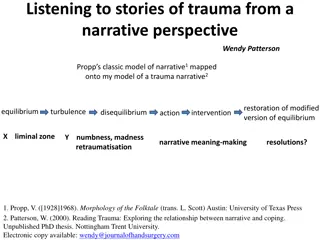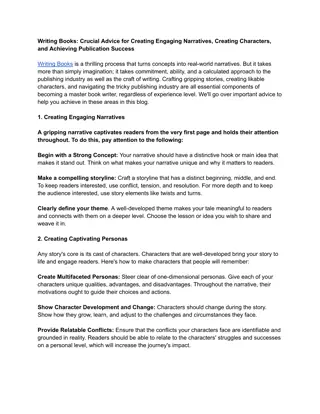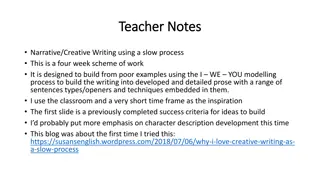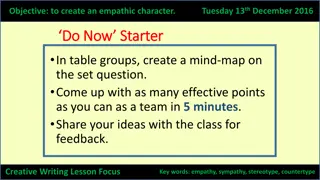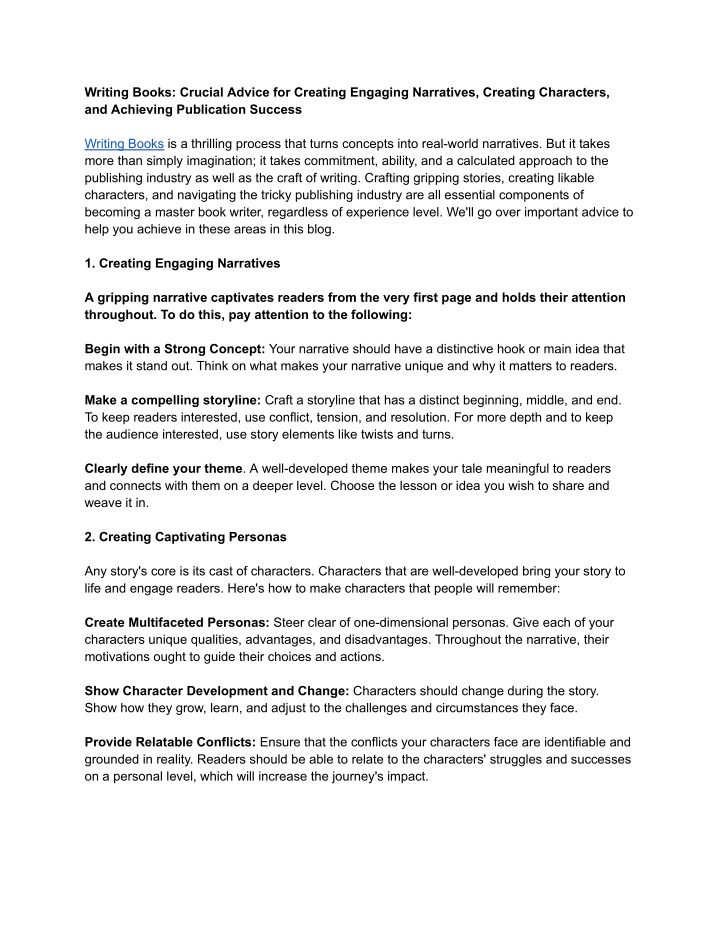
Writing Books_ Crucial Advice for Creating Engaging Narratives, Creating Characters,
Writing Books is a thrilling process that turns concepts into real-world narratives. But it takes more than simply imagination; it takes commitment, ability, and a calculated approach to the publishing industry as well as the craft of writing. Crafti
Download Presentation

Please find below an Image/Link to download the presentation.
The content on the website is provided AS IS for your information and personal use only. It may not be sold, licensed, or shared on other websites without obtaining consent from the author. If you encounter any issues during the download, it is possible that the publisher has removed the file from their server.
You are allowed to download the files provided on this website for personal or commercial use, subject to the condition that they are used lawfully. All files are the property of their respective owners.
The content on the website is provided AS IS for your information and personal use only. It may not be sold, licensed, or shared on other websites without obtaining consent from the author.
E N D
Presentation Transcript
Writing Books: Crucial Advice for Creating Engaging Narratives, Creating Characters, and Achieving Publication Success Writing Books is a thrilling process that turns concepts into real-world narratives. But it takes more than simply imagination; it takes commitment, ability, and a calculated approach to the publishing industry as well as the craft of writing. Crafting gripping stories, creating likable characters, and navigating the tricky publishing industry are all essential components of becoming a master book writer, regardless of experience level. We'll go over important advice to help you achieve in these areas in this blog. 1. Creating Engaging Narratives A gripping narrative captivates readers from the very first page and holds their attention throughout. To do this, pay attention to the following: Begin with a Strong Concept: Your narrative should have a distinctive hook or main idea that makes it stand out. Think on what makes your narrative unique and why it matters to readers. Make a compelling storyline: Craft a storyline that has a distinct beginning, middle, and end. To keep readers interested, use conflict, tension, and resolution. For more depth and to keep the audience interested, use story elements like twists and turns. Clearly define your theme. A well-developed theme makes your tale meaningful to readers and connects with them on a deeper level. Choose the lesson or idea you wish to share and weave it in. 2. Creating Captivating Personas Any story's core is its cast of characters. Characters that are well-developed bring your story to life and engage readers. Here's how to make characters that people will remember: Create Multifaceted Personas: Steer clear of one-dimensional personas. Give each of your characters unique qualities, advantages, and disadvantages. Throughout the narrative, their motivations ought to guide their choices and actions. Show Character Development and Change: Characters should change during the story. Show how they grow, learn, and adjust to the challenges and circumstances they face. Provide Relatable Conflicts: Ensure that the conflicts your characters face are identifiable and grounded in reality. Readers should be able to relate to the characters' struggles and successes on a personal level, which will increase the journey's impact.
3. Managing the Success of Publications The next step after finishing your manuscript is to navigate the publication market. The following strategies can help you succeed in publishing: Know Your Publishing Options: To choose which publishing option is ideal for you, do some study on self-publishing, hybrid publishing, and traditional publishing. Traditional publishing offers more distribution and professional help, but self-publishing offers greater flexibility and a higher income. Prepare a Professional Manuscript: Before submitting your work to publishers or agents, make sure it has been thoroughly reviewed and edited. A well-written manuscript increases your chances of being accepted and demonstrates your commitment to delivering excellent work. In conclusion There is much more to writing a book than just putting words on paper; it is both an art and a craft. Your chances of writing a book that connects with readers and becomes successful can be increased by concentrating on telling gripping stories, building characters that readers will care about, and skillfully navigating the publishing landscape. Remember that every writer's road is different, embrace the adventure, and remain dedicated to your objectives. Your novel can find a home in the literary canon and leave a lasting impression with the correct approaches and dedication.

